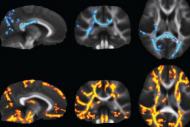A new study conducted at UCSF looked at “mid-level” marijuana users and found that this group had worse verbal memory but no deficiencies in other measures of cognitive function.
In the largest and longest study thus far of ethnic disparities in dementia risk, researchers compared six ethnic and racial groups within the same geographic population and found significant variation in dementia incidence among them.
You don't have to be an NFL star to throw better than any of our closest primate relatives. Human evolution has given us both the brain and brawn we need to make precise throws, but it comes with a few trade-offs.
A study of 35 families led by a UCSF psychiatric researcher showed for the first time that the structure of the brain circuitry known as the corticolimbic system is more likely to be passed down from mothers to daughters than from mothers to sons or from fathers to children of either gender.
Researchers at UCSF have found that boys and girls with sensory processing disorder (SPD) have altered pathways for brain connectivity when compared to typically developing children, and the difference predicts challenges with auditory and tactile processing.
Children and young adults with severe forms of epilepsy that does not respond to standard antiepileptic drugs have fewer seizures when treated with purified cannabinoid, according to a multi-center study led by researchers from UCSF Benioff Children’s Hospital San Francisco.
The workings of neural circuits associated with creativity are significantly altered when artists are actively attempting to convey emotions, according to a new brain-scanning study of jazz pianists.
We asked experts across UCSF to identify what's ahead in how we approach research, what disease areas will see major advances, and where basic science will be translating into real treatments.
If depression is caused by flawed brain circuitry, it may be possible to shift that circuitry toward healthy neural processing instead. UCSF researchers hope to map and correct aberrant neural behavior to cure mood disorders.
Louis Ptacek and William Seeley have been selected as fellows of the American Association for the Advancement of Science, the world’s largest general scientific society.









